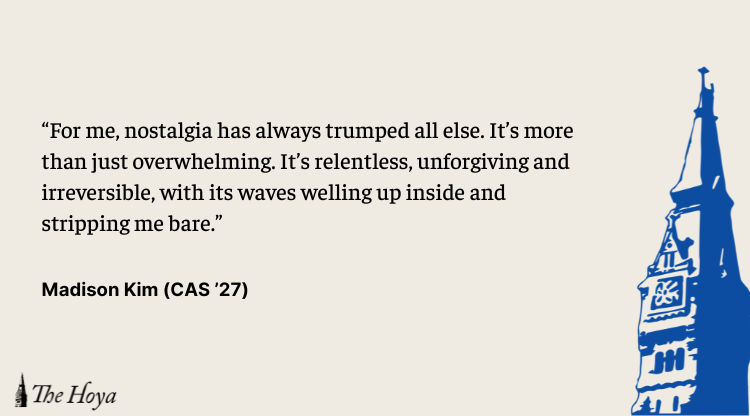Despite having lived with my father for my entire life, I know very little about who he is — something that has brought me a great deal of distress since my childhood.
He was never the type to willingly offer up any information about himself; and to get a grasp on who he really was, I often compensated by making inferences based on my own observations. Take, for example, my knowledge that his favorite song is Bobby Darin’s “Beyond the Sea.”
Technically, the word “favorite” is somewhat of an exaggeration. More often than not, his car’s Bluetooth system failed, resulting in an unsurprising decision for him to play the “Bobby Darin’s Greatest Hits” CD over the crowd favorite “Multiplication Songs Deluxe.”
But regardless, since trading in his 2009 Honda Accord seven years ago, he hasn’t listened to the song — that is until our hour-long trip from Queens to D.C. It was one more time for old times’ sake, as he would say.
I’m not a particularly emotional person, so I found it quite pathetic that a song, especially this one, could bring me to tears. But I couldn’t help it. For me, nostalgia has always trumped all else. It’s more than just overwhelming. It’s relentless, unforgiving and irreversible, with its waves welling up inside and stripping me bare.
There’s no way I can stop the force of nostalgia, either.
For example, as I was making my way over the Atlantic, a particular memory resurfaced: my family’s Saturday trips to the New York Hall of Science. In a back room, past all the exhibitions, there was a space dedicated to playtime with Oobleck, a starch-water mix that was usually dyed a blue similar to that of the expanse of water below.
The tubs of Oobleck amused me and my brother for hours on end. If you slowly pressed your palm across its surface, the Oobleck liquefied, allowing your hand to sink to the bottom. Once submerged, you could scoop up the mixture and watch it envelop your entire hand. But if you tried balling up your fist and punching the surface, the Oobleck would turn rock solid and strike back, almost as if it were retaliating out of spite.
I’ve always hated the feeling of getting my hands dirty, so I find it quite funny that now, years later, I have reformulated that same concept into a strong reluctance to let the feeling of nostalgia engulf my heart in such sickly sentiments.
I’m selfish. What I really want is to dig deep into its core, its soul; I want to know nostalgia’s truth. I don’t want to refeel my memories — I want to relive them. But every time I try, I find that I’m met with nothing but a slap in the face by the cold, unrelenting passage of time. My attempts are futile, and I only end up leaving fingerprints on its surface, changing the true essence of what it once was.
I’ve always thought that refeeling certain memories, just to experience a fraction of what they once were, was terribly cruel. While there’s never enough of the memory to make me satisfied, there’s just enough to tempt me into holding on.
You can be anybody you want to be, except for the person you were just moments ago. Yet for most of my life, I’ve wanted nothing more than to go back to every single moment I’ve lived and live it again, in the exact same way as before.
This is a depressing way to live.
What I’ve come to learn is the further I cling, the more the memory seems to dilute, getting muddled by my present state of being. The further I push these memories away, the further they seem to disperse, leaving their unnecessary sentiments behind. In short, there is no way I can seize these moments without re-remembering them completely; yet there is also no way I can push these memories away without feeling incredible loss inside.
Sometimes, our memories loom over us, like stubborn tides on a stubborn shore. On other occasions, they wash over us in waves, and there is simply nothing we can do. And standing in the water for too long is just going to leave your socks soggy and full of sand.
Now, as I settle in at Georgetown University, traversing the East Coast, I find myself among a community of those with lived experiences I would’ve never previously fathomed, speaking to the multitude of prospects that lie ahead. I suppose, then, that it’s quite fitting for me — and now you — to realize that the only way to manage the waves is by looking forward, beyond the sea, together.
Madison Kim is a freshman in the College of Arts and Sciences. This is the first installment of her column, Don’t Let the Dust Settle.














